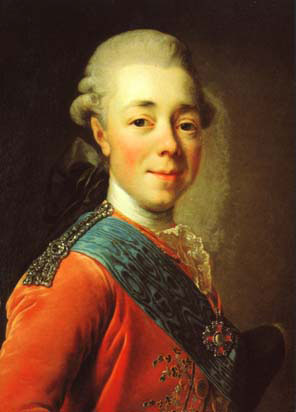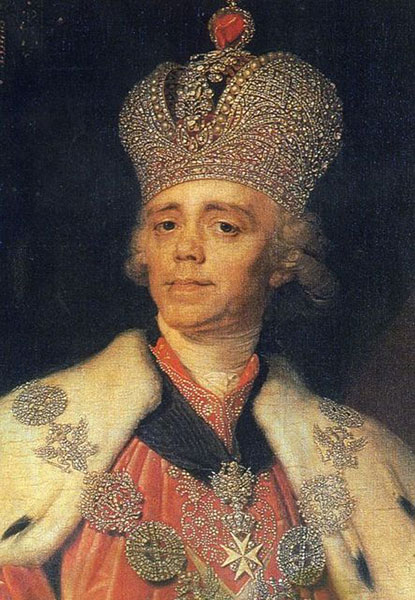
The Russian Hamlet on Display in Tsaritsyno
/ Главная / Russkiy Mir Foundation / Publications / The Russian Hamlet on Display in TsaritsynoThe Russian Hamlet on Display in Tsaritsyno

An exhibit, declared by its authors to be a “museum blockbuster”, has opened at the Tsaritsyno museum-reserve in Moscow. The focus of the exhibit is Emperor Pavel I and it comes some 250 years after his birth and 200 years since his murder, which earned him the name of Russian Hamlet.
As they say in Russia: one death is unavoidable, but two are not to be. This is applicable to any save only Emperor Pavel I, who was murdered once physically and then killed off again historically by practically the same people.
He was turned into a fool, a half-crazed, deranged, maniac on the throne, for a hundred years by historians. “He was in his young years quite an idiot… a toy soldier,” wrote Konstantin Balmont not long before it was officially allowed to speak the truth about the death of the son the Catherine the Great. “He died of apoplectic shock,” all historical books and school textbooks reported up until 1905. “A shock no doubt caused by a blow to the head,” added those for who this royal mystery was an open secret. And some might also have asked: if he was such a half-crazed fool on the throne, why was he so quickly removed, after all, favorites of the royal court have always found it much easier to manage such monarchs?
The exhibition is called Lost illusions, and it provides definitive answers to such questions. Take the image of Pavel prior to his ascension to the throne – here he looks quite attractive and energetic, with a crafty sparkle in his eye, albeit not quite full in height and stature. But in the portrait painted only a half a year before that fateful March 11, 1801, he looks like a profound and weary old man. Let me remind that here he is only 46 years old. Too great was the difference between the Gatchina and Pavlovsk estates (the only thing which Pavel truly reigned over) and the entire vast Russian Empire, the reins of which Ekaterina did not intend to pass on to Pavel. It was the sudden death of the empress that prevented the publication of her manifesto on the passage of the throne directly to her grandson Alexander.

Her son, as the multitude of documents at the exhibition attest, was one of Russia’s long line of failed and would-be reformers who recognized the dangers of many of yet untreated ulcers of Russian life. The essence of the tragedy of these failed reformers would be expressed in on short and cutting phrase uttered by his eldest son a quarter of a century later: “There is no one to choose from…”
The subsequent hymns to ‘the golden age of the Russian nobility’ modestly ignore the fact that at the end of the ‘fat’ years of Catherine’s rule, Russia was, similarly to Greece and Italy today, on the verge of financial default. The lot of the peasants needed to be eased, and so in line with the ideals of the Knights Hospitaller (Order of Malta) of which Pavel had become the Grand Master, the emperor signed a decree lighten the labor load of peasants. The quill with which he signed this decree is on display at the exhibit. He had to force the gigantic government apparatus to work, which he did by his own example – starting his work day at six in the morning. And bureaucrats, previously accustomed to working two to three hours a day at most, were forced to do the same. As they say, this was a lifestyle incompatible with life.
And so he was killed: beaten to death or suffocated, it’s hard to say now. And the portraits of the perpetrators also hang there at the exhibits: Count von Bennigsen, Peter Pahlen and others.
Perhaps most telling was a remark by the discerning Madame de Sta
New publications

 Mikhail Kalatozov, a director who transformed the world of cinematography in many ways, was born 120 years ago. He was a Soviet film official and a propagandist. Above all, he was capable of producing movies that struck viewers with their power and poetic language.
Mikhail Kalatozov, a director who transformed the world of cinematography in many ways, was born 120 years ago. He was a Soviet film official and a propagandist. Above all, he was capable of producing movies that struck viewers with their power and poetic language.  Ukrainian authorities have launched a persecution campaign against the canonical Ukrainian Orthodox Church (UOC), the biggest one in the country's modern history. Over the past year, state sanctions were imposed on clergy representatives, searches were conducted in churches, clergymen were arrested, criminal cases were initiated, the activity of the UOC was banned in various regions of the country, and monasteries and churches were seized.
Ukrainian authorities have launched a persecution campaign against the canonical Ukrainian Orthodox Church (UOC), the biggest one in the country's modern history. Over the past year, state sanctions were imposed on clergy representatives, searches were conducted in churches, clergymen were arrested, criminal cases were initiated, the activity of the UOC was banned in various regions of the country, and monasteries and churches were seized.  When Nektary Kotlyaroff, a fourth-generation Russian Australian and founder of the Russian Orthodox Choir in Sydney, first visited Russia, the first person he spoke to was a cab driver at the airport. Having heard that Nektariy's ancestors left Russia more than 100 years ago, the driver was astonished, "How come you haven't forgotten the Russian language?" Nektary Kotlyaroff repeated his answer in an interview with the Russkiy Mir. His affinity to the Orthodox Church (many of his ancestors and relatives were priests) and the traditions of a large Russian family brought from Russia helped him to preserve the Russian language.
When Nektary Kotlyaroff, a fourth-generation Russian Australian and founder of the Russian Orthodox Choir in Sydney, first visited Russia, the first person he spoke to was a cab driver at the airport. Having heard that Nektariy's ancestors left Russia more than 100 years ago, the driver was astonished, "How come you haven't forgotten the Russian language?" Nektary Kotlyaroff repeated his answer in an interview with the Russkiy Mir. His affinity to the Orthodox Church (many of his ancestors and relatives were priests) and the traditions of a large Russian family brought from Russia helped him to preserve the Russian language.

 The leaders of the Friends of the Great Russia cultural association (Amici Della Grande Russia) in Italy believe that the Western policy of abolishing Russian culture in Europe has finally failed. Furthermore, it was doomed to failure from the beginning.
The leaders of the Friends of the Great Russia cultural association (Amici Della Grande Russia) in Italy believe that the Western policy of abolishing Russian culture in Europe has finally failed. Furthermore, it was doomed to failure from the beginning.  Name of Vladimir Nemirovich-Danchenko is inscribed in the history of Russian theater along with Konstantin Stanislavski, the other founding father of the Moscow Art Theater. Nevertheless, Mr. Nemirovich-Danchenko was a renowned writer, playwright, and theater teacher even before their famous meeting in the Slavic Bazaar restaurant. Furthermore, it was Mr. Nemirovich-Danchenko who came up with the idea of establishing a new "people's" theater believing that the theater could become a "department of public education."
Name of Vladimir Nemirovich-Danchenko is inscribed in the history of Russian theater along with Konstantin Stanislavski, the other founding father of the Moscow Art Theater. Nevertheless, Mr. Nemirovich-Danchenko was a renowned writer, playwright, and theater teacher even before their famous meeting in the Slavic Bazaar restaurant. Furthermore, it was Mr. Nemirovich-Danchenko who came up with the idea of establishing a new "people's" theater believing that the theater could become a "department of public education."  "Russia is a thing of which the intellect cannot conceive..." by Fyodor Tyutchev are famous among Russians at least. December marks the 220th anniversary of the poet's birth. Yet, he never considered poetry to be his life's mission and was preoccupied with matters of a global scale. Mr.Tyutchev fought his war focusing on relations between Russia and the West, the origins of mutual misunderstanding, and the origins of Russophobia. When you read his works today, it feels as though he saw things coming in a crystal ball...
"Russia is a thing of which the intellect cannot conceive..." by Fyodor Tyutchev are famous among Russians at least. December marks the 220th anniversary of the poet's birth. Yet, he never considered poetry to be his life's mission and was preoccupied with matters of a global scale. Mr.Tyutchev fought his war focusing on relations between Russia and the West, the origins of mutual misunderstanding, and the origins of Russophobia. When you read his works today, it feels as though he saw things coming in a crystal ball...